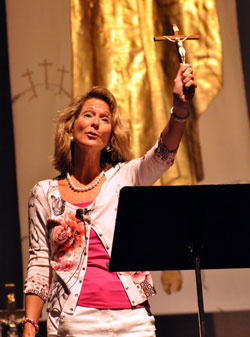Women's Conference
Theology of the body expert encourages women to ‘radiate God’s love’

Catholic author Katrina Zeno of Phoenix holds a crucifix on Sept. 17 while explaining Church teachings on the resurrection of the body. She was one of three keynote speakers during “God Alone,” the 2011 Indiana Catholic Women’s Conference, at Cathedral High School in Indianapolis. (Photo by Mary Ann Garber)
By Mary Ann Garber
“Live for God,” author and keynote speaker Katrina Zeno of Phoenix urged participants at “God Alone,” the 2011 Indiana Catholic Women’s Conference, on Sept. 17 at Cathedral High School in Indianapolis.
“Pray for God’s graces in your lives,” she said, and try to “radiate God’s love to the world” each day.
Zeno is coordinator of the John Paul II Resource Center for Theology of the Body and Culture for the Diocese of Phoenix.
In 1996, she co-founded Women of the Third Millennium, a lay organization that promotes the dignity, vocation and mission of women as well as men through retreats, talks, articles and books.
The organization was a response by Zeno and
co-founder Zoë Romanowsky to Blessed John Paul II’s call to develop a new Catholic feminism. Now, the lay group also ministers to single and married people.
When Zeno presents programs based on the late pope’s teachings about the theology of the body, she reminds people that we should love our bodies and respect them by living free from sin.
Her books include Every Woman’s Journey: Answering ‘Who am I’ for the Feminine Heart, The Body Reveals God: A Guided Study of John Paul II’s Theology of the Body and When Life Doesn’t Go Your Way: Hope for Catholic Women Facing Pain and Disappointment.
“Get used to your body because it will be with you for all eternity,” Zeno told the women.
“… Someday we are going to be reunited with our bodies in heaven. … Our bodies are destined to be raised and glorified.”
Sadly, she said, Church teachings about the resurrection of the body have “dropped out of common Catholic knowledge.”
That may be a result of a misunderstanding of the Nicene Creed, Zeno said, which is prayed during Sunday Mass and solemn feasts.
“In the Nicene Creed, … we say ‘We look for the resurrection of the dead’ because that’s the older formula that we find in [the writings of] St. Paul,” she explained. “It’s only through the Apostles Creed with the rosary that you say specifically ‘I believe in the holy Catholic Church, the communion of saints, the forgiveness of sins, the resurrection of the body and life everlasting.’ ”
Zeno also based her presentation on Church teachings about the doctrines of the Immaculate Conception and Assumption of Mary, which she said are often misunderstood by Catholics.
“Mary shows us what life is like in the beginning before original sin, and she also shows us where our life is going,” Zeno said.
“… We will have our bodies raised and glorified, and we will dwell in God’s glory forever.”
“The Apostolic Constitution Defining the Dogma of the Assumption of Mary” was declared by Pope Pius XII on Nov. 1, 1950, she said, and is explained in the Catechism of the Catholic Church as are Church teachings on the resurrection of the body.
“As Catholics, we believe that Mary was assumed into heaven both body and soul because she was free from the effects of original sin,” Zeno said. “… The doctrine of the Assumption shows us what it means to be a human person—to have body and soul united together perfectly forever.”
Many Catholics have the mistaken notion that God loves our souls and not our bodies, she said. “For all eternity, God has destined your soul and your body to be joined together. …Your body is the very means by which we live for God and God alone.”
When Catholics pray before the Blessed Sacrament, we see the glory of God, Zeno reminded the women. When Catholics receive the Eucharist, “we become a living tabernacle, … the place where God dwells on Earth in bodily form.”
Without the Incarnation, she said, without Jesus’ bodily death on the cross, and without Jesus’ resurrected and glorified body, we would not have Christianity.
“Without his resurrected and glorified body, it would be impossible to have the Eucharist,” Zeno said, holding a crucifix.
“Without the body of Christ, there is no salvation,” she emphasized. “It is through the body of Christ, through the Church, that we receive salvation. … Therefore, glorify God in your body.”
In his epistles, St. Paul reminds us that the body is a temple of the Holy Spirit, she said, so take care of your body by getting adequate sleep, eating healthy food and exercising regularly.
“Be a better friend to your body,” Zeno said, to better do God’s work in daily life. †
